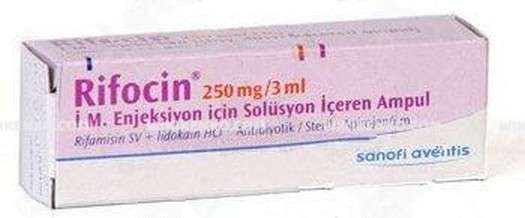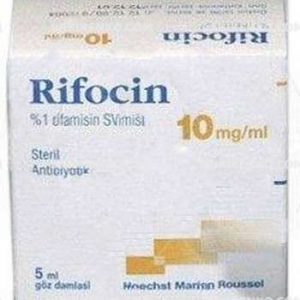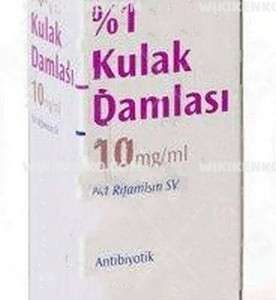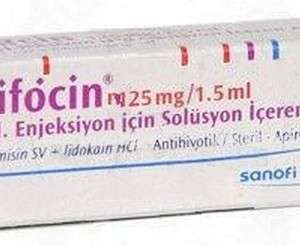Rifocin Im Injection Icin Solution Iceren Ampul 250 Mg/3Ml
Rifocin is a powerful antibiotic belonging to the rifamycin group, and it is commonly used to treat a variety of infections caused by gram-positive microorganisms. Its active ingredient is rifamycin SV (sodium salt), and it comes in different forms such as ampoules and ear drops. While Rifocin is generally safe to use, it may cause some side effects, including skin discoloration, nausea, vomiting, and stomach pain. Therefore, it is essential to follow your doctor’s instructions carefully and seek medical attention if you experience any serious side effects.
| Manufacturer | |
|---|---|
| Origin | |
| Generic Name (Ingredient) | Rifamycin Sv 250 Mg Lidocaine Hydrochloride Monohydrate 10 Mg |
Assuming your emergency circumstances for this product, visit Urgent Quotation page. Besides, for any pharmaceutical questions, please ask us in the comments section.
Description
What is it Used For?
Rifocin is an antibiotic that contains 250 mg of rifamycin SV (sodium salt) as its active ingredient. It is packaged in a 3 ml ampoule and is also available in the market as an ear drop and a 125 mg ampoule form. Rifocin is particularly effective against gram-positive microorganisms that are sensitive to Rifocin, especially when other antibiotic treatments have failed.
it is commonly prescribed for the following conditions:
- Infections caused by gram-positive microorganisms that are sensitive to Rifocin, especially when other antibiotic treatments have failed.
- Skin and soft tissue infections such as furunculosis (boils), pyoderma (pus-filled skin infection), abscesses, and lymphadenitis (lymph node inflammation).
- Osteomyelitis (bone inflammation).
- Bronchopulmonary infections caused by gram-positive microorganisms, staphylococcal bacteremia (proliferation of staphylococcus bacteria in the blood).
- Bacterial infections related to the bile ducts, including those caused by gram-negative microorganisms or mixed flora.
Precautions
It is important to take certain precautions before using Rifocin. Do not use it if you are allergic to rifamycin or any other ingredients in Rifocin, including lidocaine. Also, avoid using it if you have severe liver failure or a condition that causes obstruction of your bile ducts. Moreover, if you are pregnant or in the first three months of pregnancy, you should avoid using it.
Possible Side Effects
As with any medication, Rifocin may cause some side effects. The common side effects of Rifocin include red, orange, or brown discoloration of your skin, tears, sweat, saliva, urine, or stools, nausea, vomiting, diarrhea, stomach pain, belching, bloating, loss of appetite, headache, and mild skin rash or itching.
However, if you experience any serious side effects such as severe skin rash or itching, pale skin, weakness, easy bruising or bleeding, fever, chills, body aches, flu symptoms, or eye pain or redness, vision loss, you should call your doctor immediately.
Conclusion
Rifocin is a potent antibiotic that can be effective against various bacterial infections. It is important to follow your doctor’s instructions and take the necessary precautions before using it. If you experience any serious side effects, do not hesitate to contact your healthcare provider. With the right treatment plan, you can overcome your bacterial infection and get back to your daily routine.
Use the form below to report an error
Please answer the questions as thoroughly and accurately as possible. Your answers will help us better understand what kind of mistakes happen, why and where they happen, and in the end the purpose is to build a better archive to guide researchers and professionals around the world.
The information on this page is not intended to be a substitute for professional medical advice, diagnosis, or treatment. always seek the advice for your physician or another qualified health provider with any questions you may have regarding a medical condition. Always remember to
- Ask your own doctor for medical advice.
- Names, brands, and dosage may differ between countries.
- When not feeling well, or experiencing side effects always contact your own doctor.
Cyberchondria
The truth is that when we’re sick, or worried about getting sick, the internet won’t help.
According to Wikipedia, cyberchondria is a mental disorder consisting in the desire to independently make a diagnosis based on the symptoms of diseases described on Internet sites.
Why you can't look for symptoms on the Internet
If diagnoses could be made simply from a textbook or an article on a website, we would all be doctors and treat ourselves. Nothing can replace the experience and knowledge of specially trained people. As in any field, in medicine there are unscrupulous specialists, differences of opinion, inaccurate diagnoses and incorrect test results.






Reviews
There are no reviews yet.